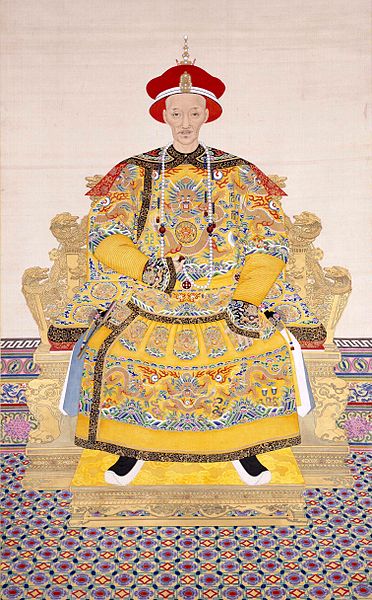<Back to Index>
- 8th Qing Emperor of China Daoguang, 1782
- Commander of the Qing Army Prince Yijing, 1793
PAGE SPONSOR

The Daoguang Emperor (Chinese: 道光帝, Manchu: ᡩᠣᡵᠣ ᡝᠯᡩᡝᠩᡤᡝ; 16 September 1782 – 25 February 1850) was the eighth emperor of the Manchurian Qing dynasty and the sixth Qing emperor to rule over China, from 1820 to 1850.
He was born in the Forbidden City, Beijing, and was given the name Mianning (綿寧), changed into Minning (旻寧; Manchu: ᠮᡳᠨ ᠨᡳᠩ) when he became emperor: the first character of his private name was changed from Mian (綿) to Min (旻) so as to avoid the relatively common Mian character. This novelty was introduced by his grandfather the Qianlong Emperor who thought it not proper to use a common character in the emperor's private name due to the long standing practice of naming taboo.
He was the second son of Yongyan (永琰), who became the Jiaqing Emperor in 1796. His mother, the principal wife of Yongyan, was Lady Hitara of the (Manchu) Hitara clan, who became empress when Jiaqing ascended the throne in 1796. She is known posthumously as Empress Xiaoshurui (孝淑睿皇后).
Mianning was well liked by his grandfather the Qianlong Emperor and frequently accompanied the elderly emperor on hunting trips. On one such trip at the age of nine he successfully hunted a deer which greatly amused Qianlong. In 1813, while a prince, Mianning also played a vital role in repelling and killing White Lotus invaders who stormed the Forbidden City. This action earned Mianning important merits in securing his claim for the throne.
In September 1820, at the age of 38, Mianning inherited the throne after his father the Jiaqing Emperor suddenly died of unknown causes. Now known as the Daoguang Emperor, he inherited a declining empire with Western imperialists encroaching upon the borders of China. During his reign, China experienced major problems with opium, which was imported into China by British merchants. Opium had started to trickle into China during the reign of his great grandfather Emperor Yongzheng but was limited to approximately 200 chests annually. By the time of Emperor Qianlong's reign, this amount had increased to 1000 chests, 4000 chests by Jiaqing's era and more than 30,000 chests during Daoguang's reign. He issued many edicts against opium in the 1820s and 1830s, which were carried out by Commissioner Lin Zexu. Lin Zexu's effort to halt the spread of opium in China led directly to the First Opium War. With the development of the Opium War, Lin was made a scapegoat and the Daoguang emperor removed Lin's authority and banished him to Yili. Meanwhile in the Himalayas, the Sikh Empire attempted an occupation of Tibet but where defeated in the Sino - Sikh war (1841 – 1842). But on the coasts, technologically and militarily inferior to the European powers, China lost the war and surrendered Hong Kong by way of the Treaty of Nanking in August 1842.
In 1831 Daoguang killed his own 23 year old son after striking him. In 1831 an attempt was made to usurp the throne and oust Daoguang by someone else. In 1850 this happened again, though it did not succeed.
In 1811 a clause sentencing Europeans to death for spreading Catholicism had been added to the statute called "Prohibitions Concerning Sorcerers and Sorceresses" (禁止師巫邪術) in the Great Qing Code. Protestants hoped that the Chinese government would discriminate between Protestantism and Catholicism, since the law mentioned the latter by name, but after Protestant missionaries gave Christian books to Chinese in 1835 and 1836, the Daoguang Emperor demanded to know who were the "traitorous natives" in Canton who had supplied them with books. The foreign missionaries were strangled or expelled by the Chinese.
Daoguang died on 25 February 1850, at the Old Summer Palace (圓明園), 8 km / 5 miles northwest of the walls of Beijing. He was succeeded by his eldest surviving son. Daoguang failed to understand the intention or determination of the Europeans, or the basic economics of a war on drugs. Although the Europeans were outnumbered, outgunned and were thousands of miles away from home, they could bring far superior firepower to bear at any point of contact along Chinese coast. The Manchu court was highly dependent on the continued flow of tax / levy payment from southern China via the Grand Canal, which was easily cut off by the British expeditionary force at ZhenJiang. He had a poor understanding of the British and the industrial revolution that Britain had undergone, preferring to turn a blind eye to the rest of the world. It was said that Daoguang did not even know where Britain was located in the world. His thirty year reign introduced the initial onslaught by western imperialism and foreign invasions that would plague China, in one form or another, for the next one hundred years.
He was interred in the Muling (慕陵 – meaning "Tomb of longing", or "Tomb of admiration") mausoleum, which is part of the Western Qing Tombs (清西陵), 120 kilometers / 75 miles southwest of Beijing.
Yijing (Chinese: 奕經; 1793 – 1853) was a Manchu prince of the Qing Dynasty. He was a cousin of the Daoguang Emperor. In 1826, he served at Kashgar as a junior officer in the campaign against Jahangir Khoja. During the First Opium War, after the British captured Zhenhai and Ningpo, the emperor ordered Yijing to go to Zhejiang on 18 October 1841 and take command of a counter - offensive. In the Battle of Ningpo on 10 March 1842, Yijing's troops attempted to retake the city, but the British successfully repelled the attack.